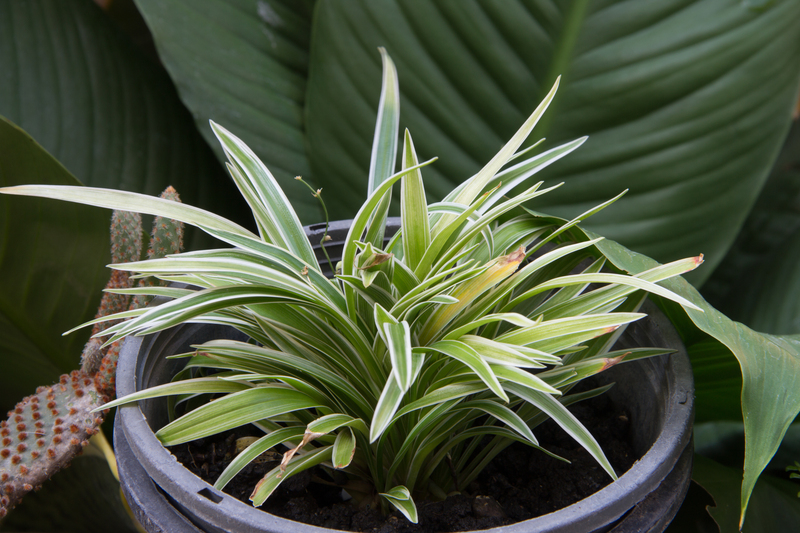Find peace with these beautiful Zen garden design concepts
Posted on 04/07/2025
In today's fast-paced world, finding tranquility can be a challenge. However, you can bring peace, serenity, and balance right to your doorstep with a Zen garden design. Rooted in centuries-old Japanese traditions, Zen gardens offer an elegant and meditative space for relaxation and reflection. In this comprehensive guide, we'll explore stunning Zen garden concepts that will transform your outdoor (or indoor) space into a true haven of peace. Whether you have a sprawling backyard or a modest patio, these ideas are perfect for anyone seeking harmony and solace.
What Is a Zen Garden?
Zen gardens, also known as Japanese rock gardens or karesansui, are minimalist landscapes designed to facilitate meditation and reflection. Traditionally composed of rocks, gravel, sand, and minimal plant elements, these gardens symbolize the natural world and are celebrated for their simple elegance. The deliberate arrangement of these elements encourages mindfulness and a sense of inner peace.
The Core Elements of Zen Garden Design
- Rocks and Stones: Representing mountains or islands, rocks are often focal points in Zen gardens. Their placement is intentional, creating a sense of balance.
- Gravel or Sand: Raked into intricate patterns, gravel or sand symbolizes water or waves. It invokes calm and a meditative state.
- Moss and Minimal Plants: While minimal, the inclusion of moss, groundcovers, or a few select plants adds softness and life.
- Lanterns and Water Basins: Traditional stone lanterns or water features can create authenticity and ambiance.
Captivating Zen Garden Concepts to Inspire Your Retreat
1. Traditional Karesansui Zen Garden
Stick to classic karesansui principles by focusing on rock groupings and raked gravel. Use large boulders to symbolize steadfast mountains. Surround them with gravel raked into swirling or parallel patterns, imitating rivers or gentle waves. Insert moss around the stones for an authentic, aged effect. This type of garden requires minimal maintenance and places emphasis on the beauty of simplicity.
2. Modern Minimalist Zen Space
If you favor contemporary aesthetics, integrate sleek lines and symmetry with traditional Zen elements. Frame your Zen garden with rectangular boundaries, use monochromatic gravels, and opt for sculptural rocks. Sparse, well-pruned plants like Japanese maple or dwarf bamboo add subtle color. This concept is ideal for small urban gardens, courtyards, or patios.
3. Lush Zen Garden with Water Feature
Enhance tranquility by including a water basin, small pond, or bamboo fountain (shishi-odoshi). The sound of moving water fosters relaxation and drowns out urban noise. Surround the water feature with smooth pebbles, moss, and low-lying ferns. Place a stone lantern nearby to complete the serene scene. This approach works well for both expansive and modest spaces.
4. Container Zen Gardens: Peace in Small Spaces
Even without a backyard, you can craft therapeutic container Zen gardens for balconies, apartment decks, or desks. Use a shallow tray or bowl, fill with fine sand or gravel, and arrange miniature rocks or driftwood. Add a tiny figurine or a sprig of moss for greenery. Rake the sand into calming patterns whenever you need a mindful break--perfect for modern work-from-home settings.
5. Zen Pathways and Stepping Stones
Design winding stone paths through your garden for a meditative walking experience. Choose irregularly shaped stepping stones to slow the pace, encouraging mindfulness with every step. Edging the path with soft moss, dwarf grasses, or creeping thyme creates a lush, contemplative journey through your Zen oasis.
6. Moss Gardens: Nature's Soft Carpet
For a deeply immersive Zen landscape, let moss take center stage. Moss gardens naturally evoke stillness and ancient wisdom. Plant varieties like sheet moss or cushion moss in shaded, moist environments for best results. Combine with weathered stones and minimalist accents to evoke a timeless, storybook tranquility.

How to Design a Zen Garden: Step-by-Step Guide
Ready to create your own peaceful sanctuary? Follow these essential steps for a successful Zen garden design:
- 1. Clear and Prepare Your Space
- Remove weeds, grass, and debris.
- Level the ground if necessary.
- 2. Create a Layout Plan
- Sketch your garden design considering the placement of rocks, gravel, and plants.
- Prioritize asymmetry to ensure a natural appearance, following Zen philosophies of wabi-sabi (embracing imperfection).
- 3. Place the Main Rocks
- Arrange large stones first, either alone or grouped in odd numbers for visual interest.
- Partially bury them for a weathered, grounded look.
- 4. Add Gravel or Sand
- Fill spaces with gravel or sand, spreading evenly.
- Rake into meditative patterns--waves, spirals, or straight lines symbolize water or flow.
- 5. Integrate Minimal Foliage
- Choose all-season evergreens or moss for low-maintenance greenery.
- Avoid crowding the space with too many plants.
- 6. Accessorize with Lanterns or Water Features
- Consider adding a stone lantern, bamboo fountain, or sculptural basin for authentic Zen ambiance.
Zen Garden Maintenance Tips
Keeping your Zen garden looking pristine is a peaceful act in itself. Here's how to maintain your beautiful retreat:
- Regular Raking: Smooth or create new patterns in the gravel or sand to refresh the meditative energy.
- Weed Removal: Promptly pluck stray weeds to preserve the minimalist aesthetic.
- Pruning: Shape any trees or shrubs periodically to maintain clean lines and healthy growth.
- Stone Care: Rinse rocks and lanterns occasionally to remove dirt and debris.
Top Plant Choices for Zen Gardens
While traditional Zen gardens are often sparse, the right plant selection enhances their natural beauty and calming influence. Consider these popular options:
- Moss: Maintains lushness year-round and thrives in shade.
- Bamboo: Offers gentle sound, movement, and a classic look.
- Japanese Maple: Adds vivid color and elegant branching.
- Ferns: Bring texture and softness to shaded edges.
- Pines: Symbolize endurance and resilience in many Zen gardens.
The Benefits of Zen Landscaping: More Than Just a Pretty Space
Zen garden design concepts provide numerous mental and even physical health benefits:
- Reduces Stress: The repetition in gardening activities and the simplicity of the design help lower anxiety levels.
- Boosts Mindfulness: Interacting with the garden (raking, weeding, pruning) engages you fully in the present moment.
- Encourages Meditation: The quiet atmosphere and intentional layout invite contemplation and stillness.
- Improves Outdoor Appeal: Even in small spaces, a Zen garden elevates your property's visual and tranquil value.
- Low Maintenance: With minimal plants and artfully arranged stones, upkeep is simple and never overwhelming.
Bringing Zen Indoors: Desktop and Tabletop Gardens
You don't need a yard to find peace--a mini Zen garden on your desk or window sill is equally effective. These portable sanctuaries are ideal for workspaces and make thoughtful gifts. Design a tabletop Zen garden using a compact tray, fine sand, a rake, small pebbles, and a few miniature objects like a Buddha or pagoda statue. The tactile act of raking and rearranging promotes relaxation during stressful days.
Zen Garden Ideas for Every Budget
Building a stunning Zen retreat doesn't require a large investment. There are beautiful Zen garden design concepts for every budget:
- DIY Zen Kit: Create an affordable DIY kit with a tray, sand, rakes, and stones from your local garden store.
- Repurpose Materials: Use found rocks, driftwood, or salvaged bricks to add unique charm on a budget.
- Grow From Seed: Start moss or ferns from seed instead of purchasing mature plants.
- Upcycled Pots: Turn old planters into small meditative landscapes for balconies or patios.

Design Mistakes to Avoid in Zen Gardens
Achieving true harmony involves mindful choices. Here are some common mistakes and tips to avoid them:
- Overcrowding with Plants: A Zen garden relies on open, negative space. Avoid cluttering with too many plants or ornaments.
- Ignoring Balance: Placement of rocks and features should feel intentional and harmonious, never random.
- Using Bright Colors: Stick to subtle, natural hues for stones and foliage to maintain the tranquil atmosphere.
- Lack of Maintenance: Even low-maintenance gardens require regular care--neglect can quickly disrupt the peaceful effect.
Conclusion: Find Your Peace with Zen Garden Design
Whether you aspire to create a vast outdoor sanctuary or a tiny personal oasis, Zen garden design concepts offer a timeless path to inner calm. Each carefully placed stone and raked pattern invites serenity. With consistent care, your Zen garden becomes both an external expression of beauty and a gentle invitation to daily mindfulness.
Take the first step toward a more peaceful life by embracing these beautiful Zen garden design ideas. Your private sanctuary awaits!
Latest Posts
Waste Not, Want Not: Rich Soil from Organic Waste
Strategies to Protect Your Garden from Strong Winds
Revamp Your Outdoor Space with 5 Cost-Effective Garden Ideas
An introduction to the versatile practice of container gardening

